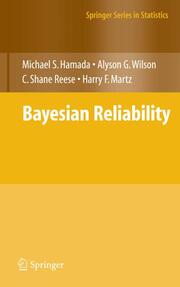-
Zusatztext
-
Bayesian Reliability presents modern methods and techniques for analyzing reliability data from a Bayesian perspective. The adoption and application of Bayesian methods in virtually all branches of science and engineering have significantly increased over the past few decades. This increase is largely due to advances in simulation-based computational tools for implementing Bayesian methods. The authors extensively use such tools throughout this book, focusing on assessing the reliability of components and systems with particular attention to hierarchical models and models incorporating explanatory variables. Such models include failure time regression models, accelerated testing models, and degradation models. The authors pay special attention to Bayesian goodness-of-fit testing, model validation, reliability test design, and assurance test planning. Throughout the book, the authors use Markov chain Monte Carlo (MCMC) algorithms for implementing Bayesian analyses -- algorithms that make the Bayesian approach to reliability computationally feasible and conceptually straightforward. This book is primarily a reference collection of modern Bayesian methods in reliability for use by reliability practitioners. There are more than 70 illustrative examples, most of which utilize real-world data. This book can also be used as a textbook for a course in reliability and contains more than 160 exercises. Noteworthy highlights of the book include Bayesian approaches for the following: Goodnessoffit and model selection methods Hierarchical models for reliability estimation Fault tree analysis methodology that supports data acquisition at all levels in the tree Bayesian networks in reliability analysis Analysis of failure count and failure time data collected from repairable systems, and the assessment of various related performance criteria Analysis of nondestructive and destructive degradation data Optimal design of reliability experiments Hierarchical reliability assurance testing
-
-
Kurztext
-
Bayesian Reliability presents modern methods and techniques for analyzing reliability data from a Bayesian perspective. The adoption and application of Bayesian methods in virtually all branches of science and engineering have significantly increased over the past few decades. This increase is largely due to advances in simulation-based computational tools for implementing Bayesian methods. The authors extensively use such tools throughout this book, focusing on assessing the reliability of components and systems with particular attention to hierarchical models and models incorporating explanatory variables. Such models include failure time regression models, accelerated testing models, and degradation models. The authors pay special attention to Bayesian goodness-of-fit testing, model validation, reliability test design, and assurance test planning. Throughout the book, the authors use Markov chain Monte Carlo (MCMC) algorithms for implementing Bayesian analyses--algorithms that make the Bayesian approach to reliability computationally feasible and conceptually straightforward. This book is primarily a reference collection of modern Bayesian methods in reliability for use by reliability practitioners. There are more than 70 illustrative examples, most of which utilize real-world data. This book can also be used as a textbook for a course in reliability and contains more than 160 exercises. Noteworthy highlights of the book include Bayesian approaches for the following: Goodnessoffit and model selection methods Hierarchical models for reliability estimation Fault tree analysis methodology that supports data acquisition at all levels in the tree Bayesian networks in reliability analysis Analysis of failure count and failure time data collected from repairable systems, and the assessment of various related performance criteria Analysis of nondestructive and destructive degradation data Optimal design of reliability experiments Hierarchical reliability assurance testing Dr. Michael S. Hamada is a Technical Staff Member in the Statistical Sciences Group at Los Alamos National Laboratory and is a Fellow of the American Statistical Association. Dr. Alyson G. Wilson is a Technical Staff Member in the Statistical Sciences Group at Los Alamos National Laboratory. Dr. C. Shane Reese is an Associate Professor in the Department of Statistics at Brigham Young University. Dr. Harry F. Martz is retired from the Statistical Sciences Group at Los Alamos National Laboratory and is a Fellow of the American Statistical Association.
-
Detailansicht
Bayesian Reliability
Springer Series in Statistics
Hamada, Michael S/Wilson, Alyson/Reese, C Shane et al
ISBN/EAN: 9781441926739
Umbreit-Nr.: 1729824
Sprache:
Englisch
Umfang: xvi, 436 S.
Format in cm:
Einband:
kartoniertes Buch
Erschienen am 10.11.2010
Auflage: 1/2010


